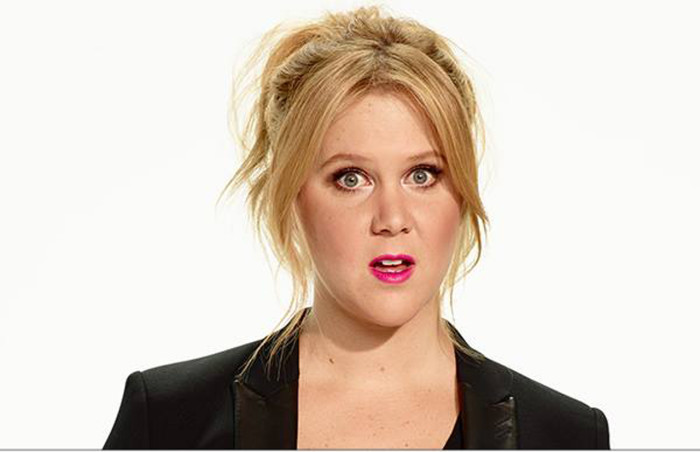Amy Schumer Is Not The Messiah Of Female Comedy…And That’s A Good Thing

People mean all sorts of different things when they say “raunchy.” That’s what I failed to take into account when I first started hearing about Amy Schumer.
“Oh, she’s great! She’s not afraid to be raunchy!”
When I heard about Trainwreck, I thought it was going to be the new Bridesmaids. And I didn’t like Bridesmaids at all.
You see, Bridesmaids was hailed as the savior of women in comedy, something that would put female comedians ‘on the map,’ as if they had been biding their time in limbo, waiting to emerge into the world fully formed. And if that were the case—I had higher hopes than to see my long-awaited funny women emerge in a scatological mess, stinking of Judd Apatow.
Of course, Bridesmaids was not the beginning for the women who wrote and starred in it. Maya Rudolph and Kristen Wiig, for example, had been on Saturday Night Live for years, and in Maya Rudolph’s case other movies and TV shows. And they had been funny. But now that they were appearing in a movie produced by a man famous for creating men’s comedies, they mattered.
Yes, I know the women wrote Bridesmaids themselves, but I couldn’t help feeling they dumbed it down to fit its context. It didn’t feel “here’s what I’ve been trying to say” to me. It felt like, “Look! Poop!”
Why am I harping on Bridesmaids? Because it was the peak of one cycle of the Messiah of Female Comedy myth. It goes like this: Women aren’t funny yet because they haven’t had the chance to be. Let’s humor them for now, guys, give them a chance, and then one day some brilliant woman will arrive on the scene and make women funny, make them matter. The narrative that the Messiah of comediennes has finally arrived repeats constantly, and many hailed the women of Bridesmaids as their saviors. I even remember a Vanity Fair cover—I think it said, “Who Says Women Aren’t Funny?”
Really, though, who’s actually saying that?
Women don’t need Judd Apatow’s seal of approval, or a magazine cover, or high box office numbers, to become funny. Women have always been funny. And I’m not just talking about Lily Tomlin, or even Fanny Bryce. I mean always. In the 900s AD, a German nun called Hrotsvit wrote a play in which God saves three young virgins from rape by casting a spell of confusion on the Roman governor. Instead of assaulting the young girls, the man fucks a pile of dirty pots and pans and then causes an uproar by walking around covered in soot for the rest of the day.
Not subtle, but it was definitely comedy. But who, other than nerds like me, remembers Hrotsvit of Gandersheim? Nobody. Because funny women get buried. Hrotsvit’s plays are temporarily lost because no one is interested in nuns’ literary production, and only found because they were also kept in a monk’s library. Hundreds of years later, Jane Austen writes six hilarious novels, which even in the face of their popularity face a slew of comments such as Mark Twain’s: “Everytime I read Pride and Prejudice I want to dig her up and beat her over the skull with her own shin-bone.” The man never offered a reason for his violent feelings about Austen.
Men. Men have been doing this.
So the myth of the Messiah of Female Comedy is, in my estimation, just the latest version of this patriarchal cover-up.
Which brings me to Trainwreck. I could see the stories repeating themselves. “Her stand-up and sketch comedy were kind of derivative, but this is finally good, guys! She’s great! She’s not afraid to be raunchy AND she’s grown up now!” The words were almost the same, the interview questions the same as the ones Wiig and Rudolph had fielded only a few years ago.
I was terrified. Paralyzed, I avoided watching Amy Schumer clips. I just didn’t want to know.
Finally, I realized I had to see this thing through. So I dove in the deep end and went to see Trainwreck.
I loved every minute of it! I was shocked. Yes, there was sexually explicit humor, but it was purposeful. There was consistent character development. There was drama and romance. The jokes were targeted. Maybe it just appealed to my “basic white girl” sensibilities, but I thought it was a genuinely good comedy movie.
Fascinated, appalled by my own reaction (determined as I am to hate whatever Judd Apatow puts his fingers in), I went to watching skits from Inside Amy Schumer and even her old stand-up bits. And I loved it all.
The narrative of the Messiah of Female Comedy is part of a longer cover-up, but it has specific traits of its own. The Messiah often mimics forms of humor associated with the masculine—scatological humor, criticism of women’s appearance or behavior, sex jokes that prioritize the man’s pleasure—or, like my beloved Tina Fey in her early days, allows her humor to be non-masculine only with a big fat wink. “Yup, guys, doing lady stuff over here!” Even though the Messiah has often been a performer I admired, I tend to steer clear of the project most associated with their ministry upon the earth. I can’t stomach it.
But the thing about Amy Schumer is also the thing about the meaning of the word “raunchy.” In Trainwreck, nobody has diarrhea in the streets, but there is a lot of sex. And talking about sex. The movie opens with a drunk Amy (her character shares her first name) persuading a guy to perform oral sex on her and then pretending to fall asleep. And I guarantee the men in the audience did not understand that the joke was on them.
Schumer’s character in Trainwreck doesn’t differ much from her old stand-up character: your “basic white girl,” afflicted with muttering and vocal fry, always drunk and taking home every guy in sight, racist and uncomfortable with the fact that she’s racist, unwilling to admit that her life is a disaster because, by God, she’s free to do what she wants.
She didn’t have to change a thing about the character because the character fits perfectly into a real-life narrative. Watching Schumer’s character deal with grief, relationships, and growing up didn’t feel awkward or saccharine. It felt personal.
All this may be because I’m a white woman who has shared many of the experiences of Schumer’s character—the death of a father and dating a medical professional, to name two remarkable coincidences. But that’s the thing. Schemer’s comedy isn’t meant to be universal. It’s not broad, it doesn’t focus on the lowest common denominator that all humans share. It is the result of lived experience filtered through a brilliant critical mind.
Amy Schumer isn’t the Messiah of Female Comedy. She’s just one good comedian in a landscape of good comedians. And that’s how it should be.






